PHOTOS & VIDEO - Andrew Carnegie Distinguished Lecture on Conflict Prevention with David A. Hamburg
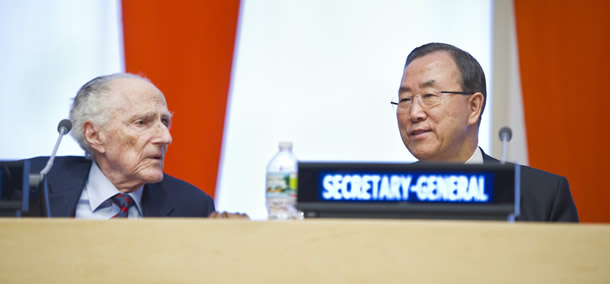 Event offered by:
Event offered by:Foreign Policy Association
United Nations
Event Details
- Date:
- Wednesday, May 1, 2013
5:00 PM - 8:00 PM - Location:
-
United Nations, ECOSOC Chamber
760 United Nations Plaza
(Entrance on 46th Street and 1st Ave)
New York , NY
- Event type
- Lecture / Panel
Event Transcripts and Video
TRANSCRIPT:
Click here for a complete transcript
NEWS:
Originally posted on the UN News Center
1 May 2013 – While the United Nations has done much to help countries establish early warning systems, build rule-based institutions and bolster civil society action, more work was needed to tackle the drivers of conflict, Secretary General Ban Ki-moon said today in an address on conflict prevention.
“The UN and its Member States have much work to do. As we strive to get prevention right, let us continue to be inspired by the contributions of David Hamburg,” the Secretary-General said in the inaugural Andrew Carnegie Distinguished Lecture on conflict prevention, which honoured Mr. Hamburg.
The event, which took place this evening at Headquarters, was co-sponsored by the United Nations and the Foreign Policy Association. Honouree David A. Hamburg, who discussed his new book Give Peace A Chance, was introduced by Robert Orr, UN Assistant Secretary-General for Strategic Planning.
“David Hamburg has made truly important intellectual contributions to the world and to the work of the United Nations,” the Secretary-General said, noting that Mr. Hamburg, during 15 years as head of the Carnegie Corporation, helped to transform the way the United Nations, Governments and the broader public looked at a range of issues, from public health and education to nuclear non-proliferation to conflict prevention.
“His work on conflict prevention has been especially notable,” Mr. Ban said, recalling that one the main priorities of his tenure as UN Chief has been to improve the Organization’s ability to address brewing tensions before they become bigger and costlier crises.
“I wanted us to make greater use of the many tools available under Chapter VI of the UN Charter to prevent armed conflict,” he said, adding that in that endeavour, a major reference point has been the seminal 1997 report of the Carnegie Commission on Preventing Deadly Conflict.
The key elements of that report still resonated today, he said, citing its focus on early action, national ownership and the critical role of civil society; the need to address the full range socio-economic and political factors to ensure lasting peace; and the acknowledgement that in extreme situations, the use of force remains an important tool to prevent even greater atrocities.
“The United Nations has come a long way in internalizing and operationalizing these insights,” the Secretary-General said, noting that UN special envoys are the most visible manifestations of the world body’s growing emphasis on preventive diplomacy.
“These envoys can now call on rapidly deployable expertise on cease-fire negotiations, power-sharing, constitutional design, gender issues and other aspects of peace processes,” said Mr. Band, adding that UN regional offices in West Africa, Central Asia and Central Africa act as forward platforms for preventive work.
“We have worked hard to bridge the gap between the political and development arms of the United Nations to more effectively address drivers of conflict,” he said. The Organization had also helped to solidly embed the Responsibility to Protect in its normative framework.
While those efforts have yielded concrete results – from Kenya to Kyrgyzstan, the UN has kept tensions from escalating, and it was accompanying difficult transition processes in Guinea, Yemen and Somalia – “we are reminded on a daily basis that prevention has limits and shortcomings,” he said citing situations in Syria, Mal, the Democratic Republic of the Congo and the Central African Republic
“Our efforts in preventive diplomacy are hampered by sovereignty concerns of Member States and fears of external interference,” Mr. Pan said, stressing that preventive action can only succeed when the international community speaks with one voice. Divisions in the Security Council or in approaches among organizations can undermine the effectiveness of mediators.
He noted that early warning also remains a challenge. Social media are helping the United Nations to take the pulse of a country or a situation. “But we have also been caught unprepared. And we need to improve our ability to engage preventively in fragile countries where we have only a development presence, as was the case in Sri Lanka,” he said.
Concluding, he said that Mr. Hamburg’s work has enabled the international community to make quantum leaps in its approach to addressing armed conflict. “As the title of his new book puts it, he is helping us all to ‘Give Peace a Chance’” the Secretary-General said.
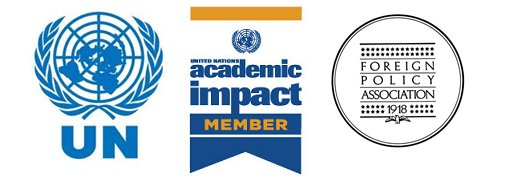
PHOTOS:
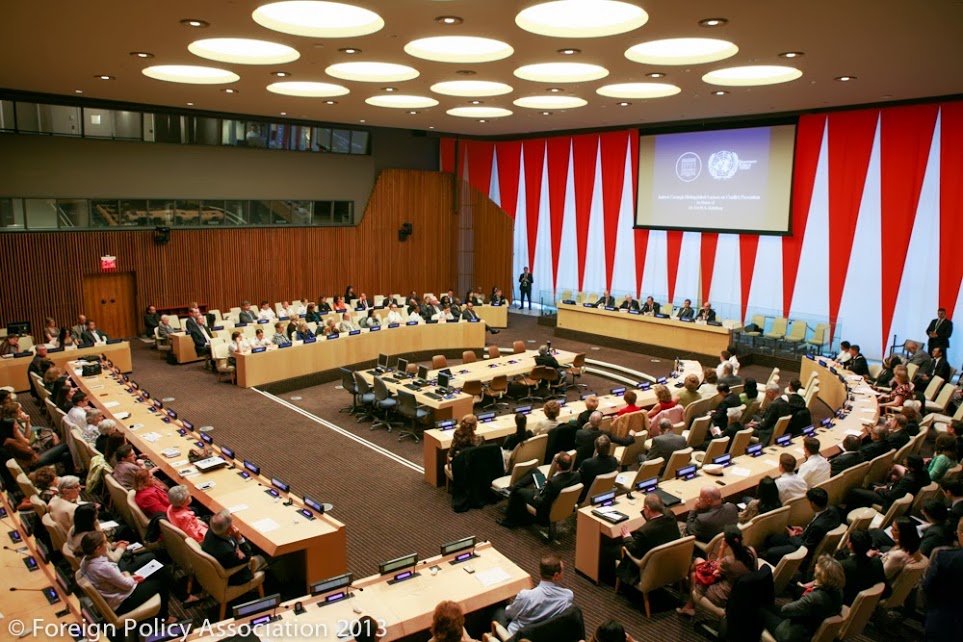
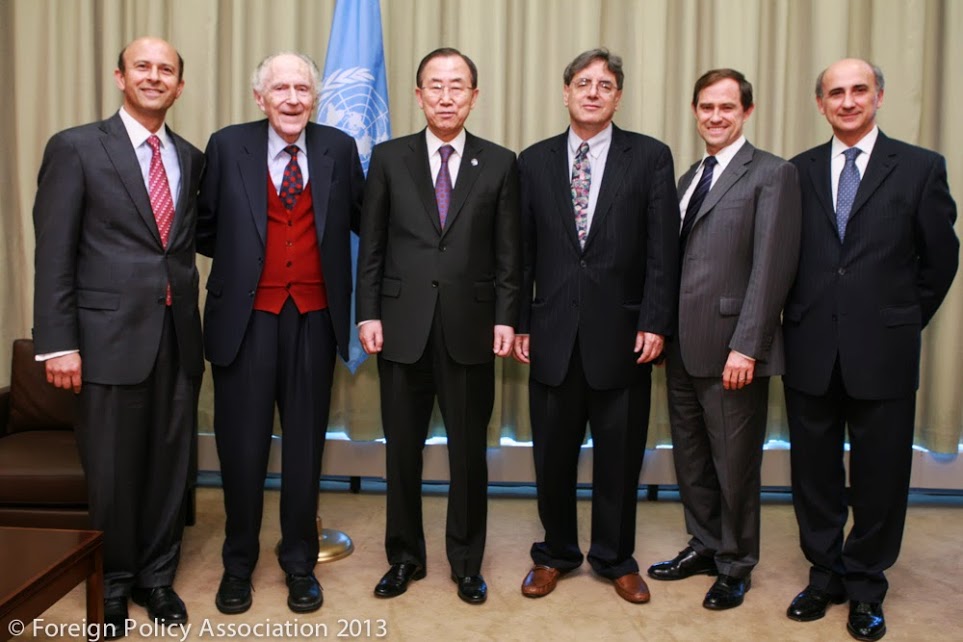
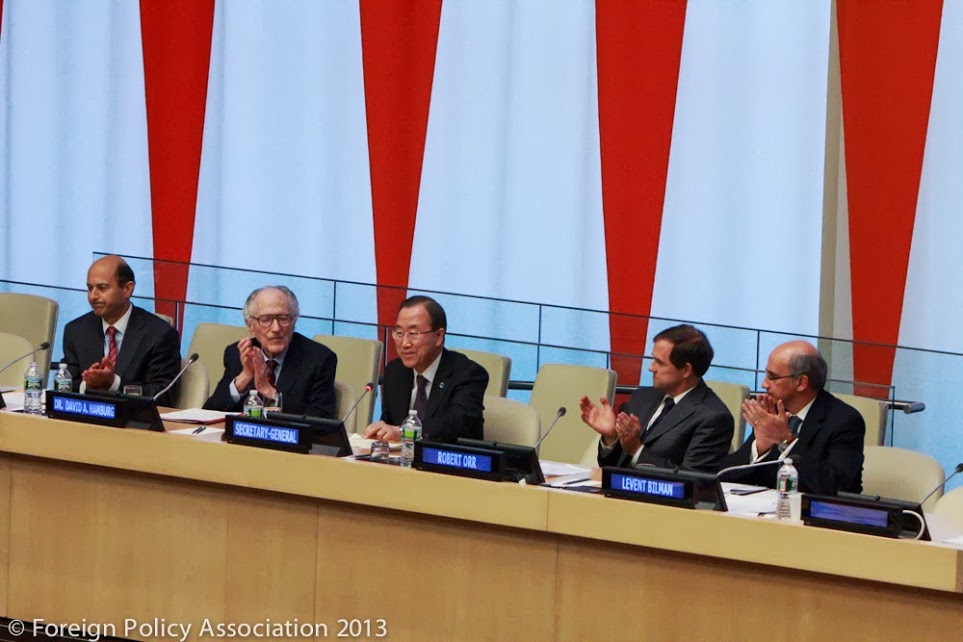
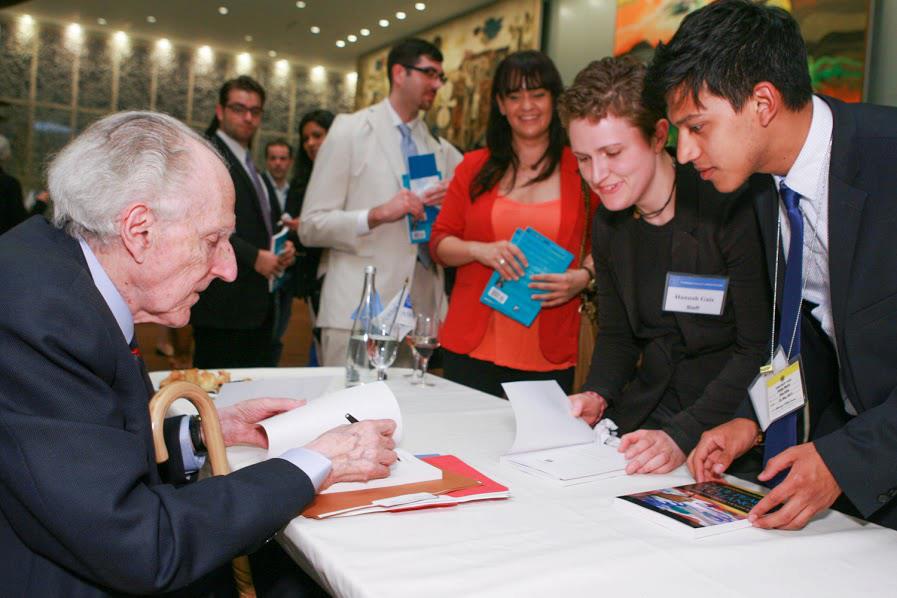
View More
VIDEO:
Event Speakers
-
-
H.E. Ban Ki-Moon - Introductory Remarks
Secretary-General, United NationsBan Ki-moon is the eighth Secretary-General of the United Nations. His priorities have been to mobilize world leaders around a set of new global challenges, from climate change and economic upheaval to pandemics and increasing pressures involving food, energy and water. He has sought to be a bridge-builder, to give voice to the world’s poorest and most vulnerable people, and to strengthen the Organization itself. "I grew up in war", the Secretary-General has said, "and saw the United Nations help my country to recover and rebuild. That experience was a big part of what led me to pursue a career in public service. As Secretary-General, I am determined to see this Organization deliver tangible, meaningful results that advance peace, development and human rights." The Secretary-General was born in the Republic of Korea on 13 June 1944. He received a bachelor's degree in international relations from Seoul National University in 1970. In 1985, he earned a master's degree in public administration from the Kennedy School of Government at Harvard University. At the time of his election as Secretary-General, Mr. Ban was his country's Minister of Foreign Affairs and Trade. His 37 years of service with the Ministry included postings in New Delhi, Washington D.C. and Vienna, and responsibility for a variety of portfolios, including Foreign Policy Adviser to the President, Chief National Security Adviser to the President, Deputy Minister for Policy Planning and Director-General of American Affairs.
Mr. Ban’s ties to the United Nations date back to 1975, when he worked for the Foreign Ministry's United Nations Division. That work expanded over the years, with assignments that included service as Chairman of the Preparatory Commission for the Comprehensive Nuclear Test Ban Treaty Organization and Chef de Cabinet during the Republic of Korea's 2001-2002 presidency of the UN General Assembly. The Secretary-General speaks English, French and Korean. He and his wife, Madam Yoo (Ban) Soon-taek, whom he met in high school in 1962, have one son, two daughters and three grandchildren. Since 2007, Mrs. Ban has devoted her attention to women’s and children’s health, including autism, the elimination of violence against women, and the campaign to prevent mother-to-child transmission of HIV/AIDS.
Mr. Ban took office on 1 January 2007. On 21 June 2011, he was unanimously re-elected by the General Assembly and will continue to serve until 31 December 2016.
-

-
-
-
Robert Orr - Presenter
Assistant Secretary-General for Strategic Planning, United NationsDr. Robert C. Orr has served as Assistant Secretary-General in the Executive Office of the Secretary-General since 2004 and is the principal advisor and leader of the Secretary-General’s initiatives on climate change, energy, global health, food security and partnership.
Dr. Orr joined the United Nations from Harvard University where he served as the Executive Director of the Belfer Center for Science and International Affairs at the Kennedy School of Government. Prior to this, he served as Director of the Council on Foreign Relations in Washington, D.C., Deputy to the U.S. Ambassador to the United Nations and Director of Global and Multilateral Affairs at the National Security Council in the White House.
Dr. Orr received his Ph.D. and M.P.A. in International Relations from the Woodrow Wilson School at Princeton University, and his bachelor’s degree from the University of California Los Angeles (UCLA). He speaks Spanish and Mandarin.
-

-
-
-
Hon. David A. Hamburg - Speaker
President Emeritus, Carnegie Corporation of New YorkDavid Hamburg is president emeritus at Carnegie Corporation of New York, where he served as the Corporation's eleventh president from 1982 to 1997. Under his leadership the work of the Corporation focused on education and healthy development of children and youth, human resources in developing countries and international security issues. He established a number of task forces on education and preventing conflict which produced seminal research and policy analysis and which will continue to influence the work in these fields in the future.
A medical doctor, Hamburg had a long history of leadership in the research, medical and psychiatric fields before his transition from a trustee of Carnegie to its president. He was chief, adult psychiatry branch, National Institutes of Health, from 1958 to 1961; professor and chairman of the department of psychiatry and behavioral sciences at Stanford University from 1961 to 1972; Reed-Hodgson Professor of Human Biology at Stanford University from 1972 to 1976; president of the Institute of Medicine, National Academy of Sciences, 1975-1980; and director of the division of health policy research and education and John D. MacArthur Professor of Health Policy at Harvard University, 1980-1983. He served as president and then chairman of the board (1984-1986) of the American Association for the Advancement of Science.
Hamburg was a member of the United States Defense Policy Board with Secretary of Defense William Perry and cochair with former Secretary of State Cyrus Vance of the Carnegie Commission on Preventing Deadly Conflict. He is a member of President Clinton's Committee of Advisors on Science and Technology and a visiting professor at Harvard Medical School's department of social medicine. He was the founder of the Carnegie Commission on Science, Technology and Government.
Hamburg received both his A.B. and M.D. degrees from Indiana University. He has received numerous honorary degrees during his career as well as the American Psychiatric Association's Distinguished Service Award in 1991, the Presidential Medal of Freedom at the White House in 1996, the International Peace Academy's 25th Anniversary Special Award in 1996, the Achievement in Children and Public Policy Award from the Society for Research in Child Development in 1997, and the National Academy of Sciences' Public Welfare Medal in 1998.
-

-
Upcoming events in this area
- Title
- Location
-
-
FPA's Elbrun Kimmelman Distinguished Lecture on U.S.-India Relations
Apr 30, 2024
-
New York , NY
-
-
-
FPA 2024 Cultural Diplomacy Dinner
May 9, 2024
-
New York, NY
-





